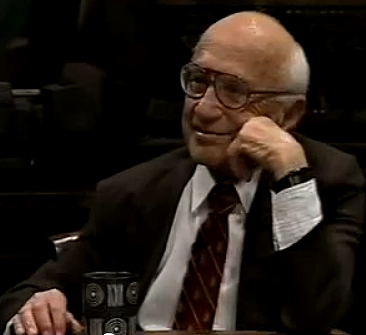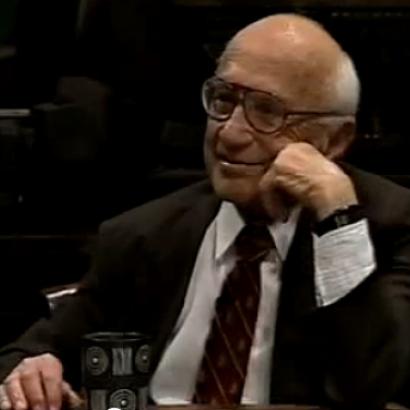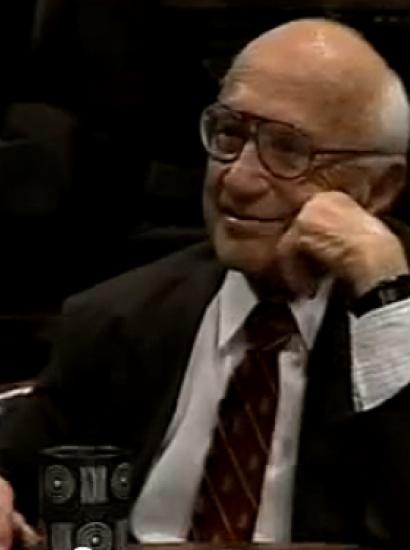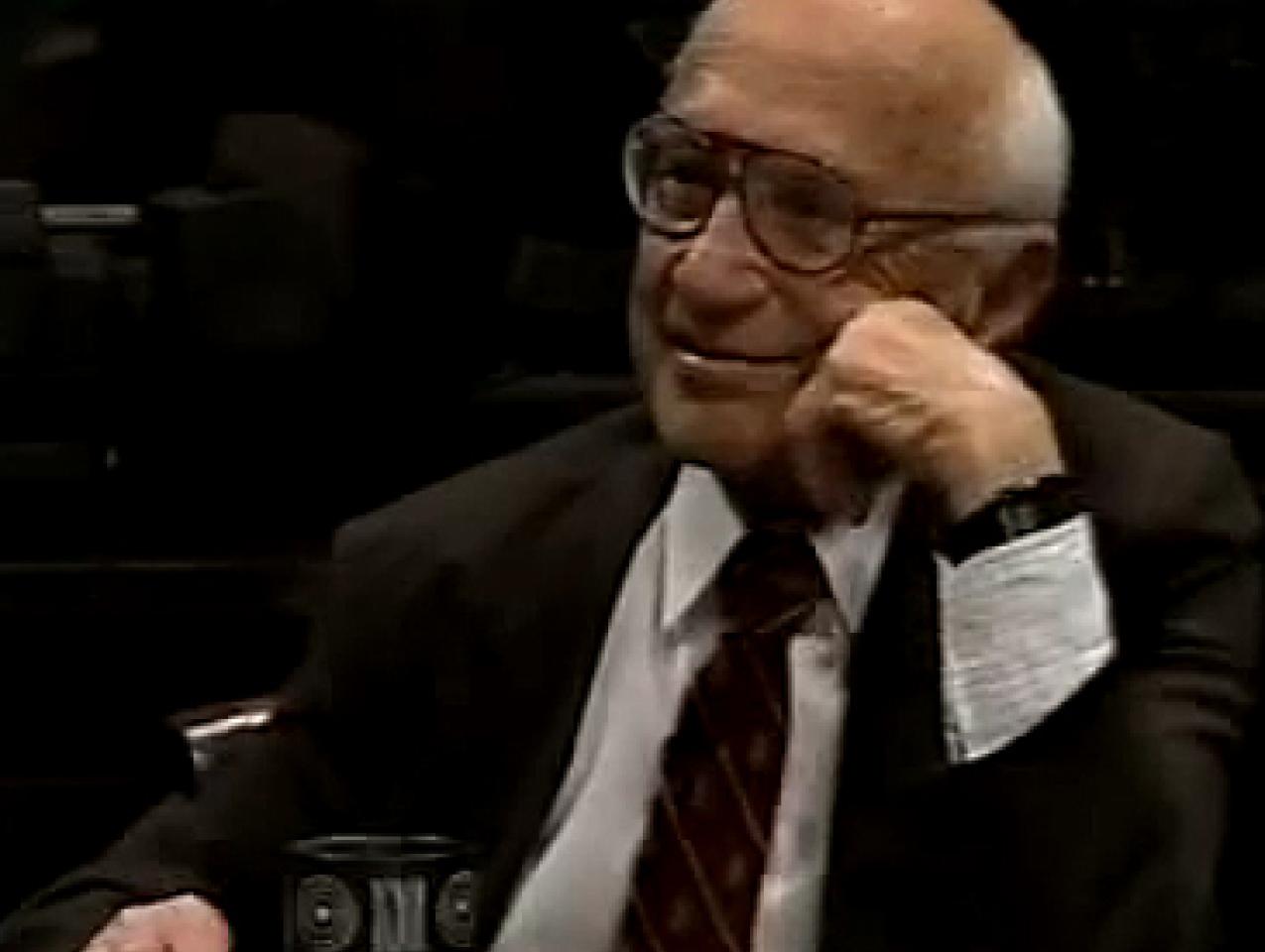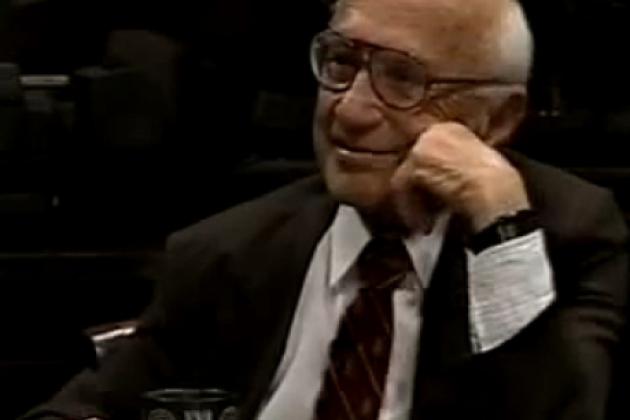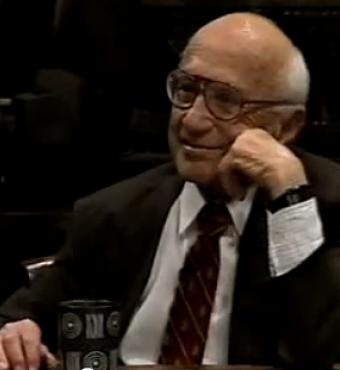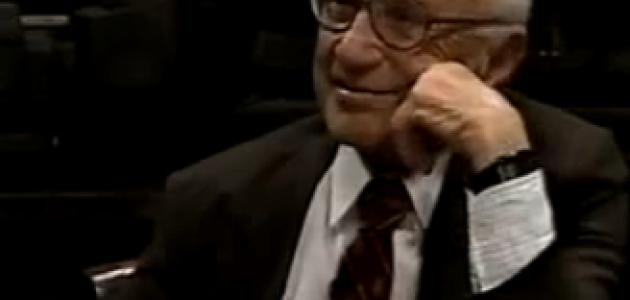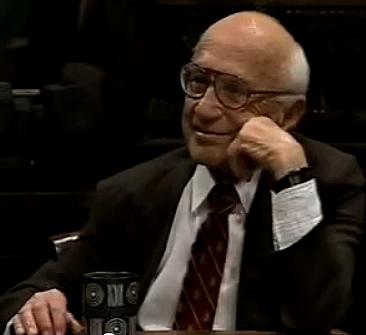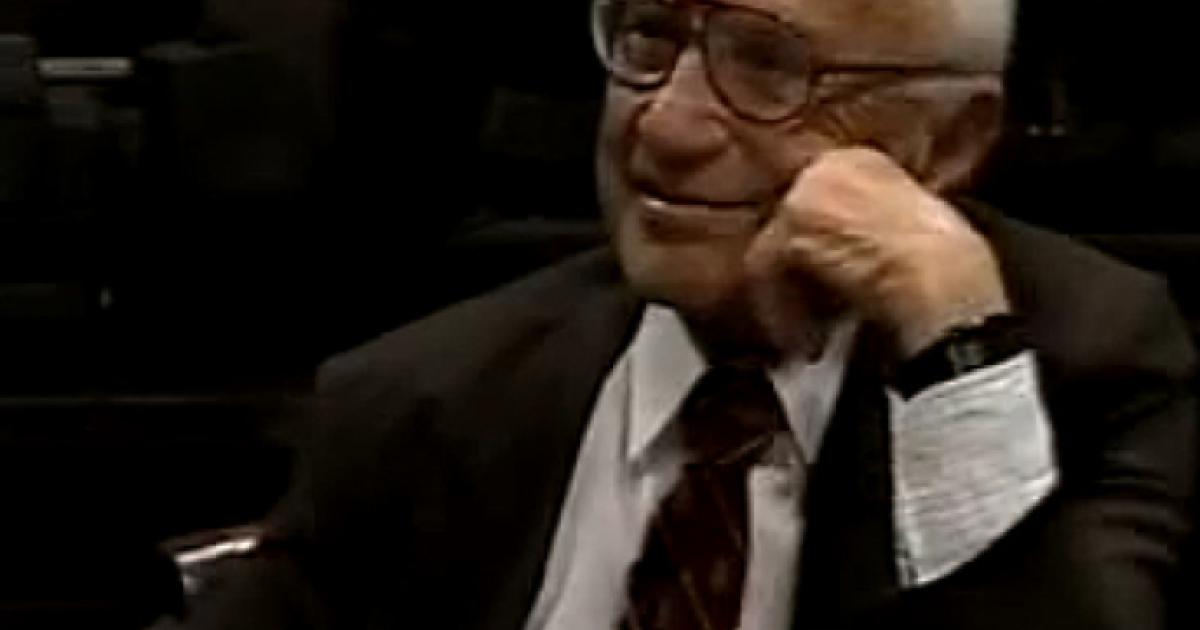- Budget & Spending
- Economics
- Security & Defense
- US Defense
- Terrorism
The September 11 attacks in New York and Washington have already cost America thousands of lives and billions of dollars in damages. But those are only the direct costs. How severe and how lasting will the impact be on our economy as whole? And how will new burdens on the federal government, including a military buildup and a bailout of the airline industry, affect fiscal policy? Should the government cut taxes or increase spending to get the economy moving again?
To view the full transcript of this episode, read below
Peter Robinson: Today on Uncommon Knowledge, the economics of the war on terrorism, a conversation with Milton Friedman.
Peter Robinson: Welcome to Uncommon Knowledge, I'm Peter Robinson. On our program today, Nobel Prize winner, Milton Friedman on the economics of America's war on terrorism.
The terrorist attacks of September 11th cost thousands of lives and did tens of billions of dollars worth of damage. Those were the direct, immediate costs but how much damage will the terrorist attacks do to the economy as a whole and how long lasting is that damage likely to prove? To get the economy moving again, should the government take action, cut taxes, increase spending? What about the new burdens the government is taking on? The huge bailout of the airline industry, the massive increases in defense expenditures.
Milton Friedman, one of the most influential economists of the last century served as an advisor to Presidents Richard Nixon and Ronald Reagan. In 1976, he received the Nobel Prize in Economic Science.
Peter Robinson: An editorial in the Wall Street Journal, I quote, "President Bush and his security advisors have shown mastery over their military and diplomatic portfolio since September 11th. The same can't be said of the economy or of his finance team, however, and this weakness has the potential to undermine his overall war leadership," closed quote. How would you grade the response of President Bush and our national leaders to the economic after effects of September 11th?
Milton Friedman: Personally, I think if anything, they've been overreacting to…
Peter Robinson: Overreacting?
Milton Friedman: …overreacting to the economic implications of September 11th.
Peter Robinson: Okay, let me probe you on that one a little bit. Can we--first let's take the fed. Here's what the fed did in the days immediately after the attacks. Cut the overnight federal funds rate from 3.5 to 3%. 3.5 was already down from a high of 6.5 in January, pumped more than seventy billion into the financial system in the form of overnight purchase agreements and allowed the interest rate to be set by the market. It dropped for a period of a couple of days to less than two percent, entered into an agreement that allowed the European Central Bank to draw up to fifty billion from the Fed of New York in return for Euros put on reserve in the Fed of New York. And this was the first time the Fed entered into an agreement with a foreign bank of that kind since the Mexican peso crisis in 1995. Liquidity, liquidity, liquidity. Was that the correct response on the part of the Fed?
Milton Friedman: That was the correct short-term response. But the Fed is very different in this respect. Once you impose a ta--additional taxes, once you add to government spending, you can't pull it back. You--there's no short-term response. On the other hand with respect to liquidity, the fed can pull that back any time it wants to.
Peter Robinson: Let me ask about that point next. Larry Kudlow, conservative writer and economist. He writes, let me quote, that the Fed is engaging in de facto tightening and Kudlow is worried that it's tightening too quickly. "Overnight money," the--he's writing now at the end of September, "Overnight money at three percent is yielding more than ninety-one day money which is at 2.2% and two-year money which is at 2.9%. This is a message that cash demands are greater than the Feds' cash additions. It's a signal of recession, not recovery. Does Mr. Greenspan listen to the market? Apparently not." So would you care to choose between Larry Kudlow and Alan Greenspan?
Milton Friedman: Have no difficulty at all. I'll take Alan any time.
Peter Robinson: What's Kudlow up to here? Why is he mistaken about this?
Milton Friedman: Well he's all along been arguing that the Fed brought on the recession by raising interest rates in 1999 and that the Fed has not been going far enough in expending it. From my point of view, the--go back before September 11th.
Peter Robinson: Right.
Milton Friedman: In--in reaction to the downturn of the economy. The Fed has allowed the money supply to grow at a rate of over ten--roughly ten percent a year sa--for over a year.
Peter Robinson: Even before it began cutting interest rates in January?
Milton Friedman: Even before it began cutting interest rates. So that from about November, I think, or earlier than that, 2000, the money supply has been going up at about ten percent a year, which is a very high number. That's a number which if long continued, means six, seven percent inflation. It won't be long continued. The Fed will pull it down and as it should. But so far, I think it's been an appropriate reaction.
Peter Robinson: The liquidity gushes into the system and the Fed, within a matter of days afterwards begins backing out some of the…
Milton Friedman: If you look at the…
Peter Robinson: …liquidity and that's the correct response?
Milton Friedman: Right.
Peter Robinson: Move in fast, make sure that the sys--financial system continues to function and then back off right away.
Milton Friedman: Right.
Peter Robinson: That, in itself, a movement that quickly, in and out, is not in--likely to be inflationary?
Milton Friedman: No, it's not likely to inflationary.
Peter Robinson: Okay so…
Milton Friedman: In order to be inflationary…
Peter Robinson: Right.
Milton Friedman: …the increase has to be over six months, nine months a year, something like that.
Peter Robinson: Was the Federal Reserve managing the money supply properly before the September 11th attacks?
Peter Robinson: Apart from the events of September 11th, as if it's possible to think apart from those events, but apart from those events, prior to those events when the Fed was increasing the money supply, round numbers ten percent a year, is that why the long-term rates were still remaining high? Because the market said, wait a minute, you can't fool us again. Long-term we're expecting inflation. Is that roughly what's going on?
Milton Friedman: I think that's right.
Peter Robinson: So the Fed was already…
Milton Friedman: I think the Fed…
Peter Robinson: …increasing supply too quickly?
Milton Friedman: Yes, in my opinion, if anything, it was too quickly. However…
Peter Robinson: Right.
Milton Friedman: …let me show you what the dilemma that Alan Greenspan and the Fed were in because this is not the typical circumstance. You're at the Fed, you're Mr. Greenspan, what are you looking back at? You're looking back at the fact that the 1990's in the United States was an incredible period of rapid expansion, both in the economy and especially in the stock market. What prior example do you think of? The 1920's…
Peter Robinson: That's what I think of.
Milton Friedman: …almost identically the same rate of inflation of the twenties, well lack of inflation, low inflation in the twenties but enormous increase in the--in the market, a great bull market. The economy very much in a good shape. And the twenties, like the nineties, were brought about by technological innovation and change. In the twenties, it was the adaptation to the electricity and to the automobile. In the nineties, we all know that it was the computer, the Internet and so on. What other example do you think of? The 1980's in Japan. Identical pattern. Rapid economic growth as a result of technological improvement and change, a bull market, '29 and '89, what do you observe afterwards?
Peter Robinson: Bad events.
Milton Friedman: Bad, bad, bad. '29, a catastrophe. In--in '89 in Japan, stagnation for a ten-year period. All right, now you're Mr. Greenspan looking back at those episodes, what are you going to say to yourself? You're going to say, if I have to take a chance, I'd rather take a chance on a little inflation than on producing--re--on--on reproducing those episodes.
Peter Robinson: And the key mistake of the Fed after the '29 crash was too little liquidity.
Milton Friedman: It's interesting. After the '29 crash, in the first few months of '29, there was ample liquidity. There was the same reaction of pouring a lot of money in.
Peter Robinson: The run on the banks didn't start at that period.
Milton Friedman: Oh no.
Peter Robinson: No.
Milton Friedman: The run on the banks didn't start until…
Peter Robinson: The system was still functioning in the first months after the stock market dropped?
Milton Friedman: That's right. And indeed, in early 1930 there was something of a little upkick in the economy but what happened then was the money supply grew hardly at all for the first year and then it started to de--decline precipitously. And that was what produced the Great Depression. And you can be sure that the Fed will not do that this time.
Peter Robinson: Right, in '89 in Japan, was there a liquidity problem there?
Milton Friedman: Japan the rate of growth of the money supply went from a very high number, I think twelve, twelve and a half percent per year, down to negative for a few months. Then it came back up but never over the whole decade, never got above thr--three or four or five percent.
Peter Robinson: Okay so you would agree--you who are the great prophet of stable money, who have devoted your career to the dangers of inflation and telling us all how to avoid them would say Allan, you're right. If you're going to err, err on the side of a little inflation.
Milton Friedman: That's right. I would also go on to say--I--I don't change my lo--my fundamental belief. I believe we all would be better off if there had been no Fed at all but simply a computer that was grinding out a st--steady, regular increase in the amount of money…
Peter Robinson: But then how would…
Milton Friedman: …all along.
Peter Robinson: …you have handled a crisis like September 11th in that case.
Milton Friedman: I wouldn't try to handle it by--at all. Let the economy handle it. The economy will do most of the handling of it. The notion that government has to step in and handle it is a mistake because when government tries to step in and handle it, it's about as likely to make it worse as better. That's what it did in '29, the thirties. That's what it did in the twenties. That's what it--and--and after all, the Fed helped promote the bull market in the nineties by its reaction to the East Asian problems.
Peter Robinson: Right.
Milton Friedman: So, in my opinion, if you would have had nothing but a computer grinding out a steady rate of increase in the quantity of money, at something like five percent a year…
Peter Robinson: And announced to everybody…
Milton Friedman: Everybody knows it. That's what ever--you would have been--you would have had less of an upturn in the nineties, you would have less of a problem now.
Peter Robinson: Can I ask…
Peter Robinson: Onto the federal government's attempts to make things better.
Peter Robinson: In the days immediately following the terrorist attacks, airlines found their jets grounded by the FAA, government action, they lost some six hundred and fifty million in revenues while the government told them to keep their jets on the ground. When flights resumed, bookings were down seventy percent. The airlines cut back on flights, laid off fifty thousand workers and asked the government for help. As we record this program, the Bush Administration has approved and Congress has enacted a fifteen billion bailout of the air--airline industry. That's about five billion in direct assistance and about ten billion in loans and loan guarantees. The right thing to do?
Milton Friedman: No. I believe that the airlines had a case for being reimbursed for the cost imposed by the FAA shutdown.
Peter Robinson: The government forces you to stop doing business, the government should make good on--on your losses.
Milton Friedman: Yeah but I think there should have been nothing more than that. We should not have had a bailout. The airline industry is a competitive industry. In some years, it's made extremely great profits. In some years, it's had losses. It is a very variable industry. It has to--if you want a competitive industry, it's got to stand on its own feet.
Peter Robinson: Okay so in the Fed, we have the government as a lender as a last resort. You would say the government should not get into the additional business of being an insurer of last resort?
Milton Friedman: That's right. Absolutely. Should not bail out private enterprises.
Peter Robinson: All right now. Le--let's go a little farther then. There have also been additional expenditures of some forty billion dollars, already authorized, backed by the Bush Administration and already enacted by Congress, it's about twenty billion for additional defense expenditures and about twenty billion headed up to New York for the rebuilding of New York. Are you in favor of both of those?
Milton Friedman: So far as defense is concerned, because it has to be a government operation, it's going to cost twice as much as it should. And there's no way of avoiding that. Obviously, we're facing a wholly different pr--security problem, defense problem than was faced during the Cold War or was faced before World War II.
Peter Robinson: That is, a just and legitimate government function, inefficient though government may be, it must be performed by government and we ought to pay what it takes.
Milton Friedman: And--right.
Peter Robinson: All right, the twenty billion to rebuild New York.
Milton Friedman: I'm not sure. I don't see why we should. I don't see why the federal government should pay for that.
Peter Robinson: Because…
Milton Friedman: First of all, much of it is covered by insurance.
Peter Robinson: Right.
Milton Friedman: So you have to at least separate out those that are not covered by insurance.
Peter Robinson: So, at a minimum, the government acted much too quickly. Who knows what the insurance claims will be.
Milton Friedman: Who knows--right…
Peter Robinson: Okay.
Milton Friedman: …and moreover, who knows what the--the damage--there are federal buildings that were affected.
Peter Robinson: Right.
Milton Friedman: Obviously the government's going to have to pay for those. But until you get that sorted out, it's a little premature just to dump twenty billion dollars on New York.
Peter Robinson: Okay, let me try a couple of arguments on you then. One, it was a supremely federal responsibility of security and intelligence and so forth to protect against the kind of terrorist attack that we saw and th--therefore the federal government should be held responsible for the consequences.
Milton Friedman: Then you believe that ev--that every state government should reimburse every person who--who's subject to theft. Somebody steals my wallet, that's a fed--that's the state government's responsibility, the city government's responsibility to protect me. And along your line, therefore, the city or the state should reimburse me for what's stolen.
Peter Robinson: You know, I was kind of hoping you'd have a little more trouble batting that one down. All right, second argument is that it was a moment of crisis, the government had to do something to demonstrate some sort of solidarity, some sort of support for the people of New York, that that is one of the things to which we look to the federal government for. Rallying the nation and twenty billion dollars is not a bad gesture.
Milton Friedman: But I think that--no it's not a bad gesture but I think that Mr. Bush did an excellent job of rallying the nation which is speeches and his talk and the sincerity with which he's taking it. And I believe what the duty of the nation is to hunt down the people who are responsible for this and--and see--and--and get rid of them, close them down, not dumping money right and left.
Peter Robinson: Does it bother you, by the way, that after--after your long career, Nobel Prize, talking about the importance of the free markets, after the triumph of free markets in the Cold War, there's no intellectual case being made anywhere anymore for statused enterprises, for central planning, that in a crisis like this, suddenly there's a great and immediate upwelling of state-ism. That is to say the first impulse is, we've got to tighten security at the airports and it must be the federal government that takes it over. We've got to rebuild New York City and it must be the federal government that pa--does that trouble you? Why is it that the lessons haven't sunk in more deeply or in a moment of crisis, is it just to be expected?
Milton Friedman: It should be expected in a moment of crisis. Unfortunately, the hardest thing for people to understand is that maybe if you leave things alone, it'll be better than stepping in and trying to do something. The hardest thing in the world to understand is that people operating separately, through their joint relations with one another, through market transactions, can achieve a greater degree of efficiency and of output, than can a single central planner.
Peter Robinson: There have been various fiscal stimulus plans proposed to get the economy back on track. Let me ask Milton Friedman what he makes of them.
Peter Robinson: There is evidence that the economy was heading into a recession even before the terrorist attacks.
Milton Friedman: In my opinion, it was in a recession.
Peter Robinson: Was in a recession already. Okay. And after the terrorist attacks, consumer confidence plunged to its lowest point as we sit here today since 1990. Now there's been a lot of talk about stimulus. Republicans in Congress want to cut the capital gains tax. The administration's floating the idea of cutting the corporate income tax. Democrats, notably former Treasury Secretary, Robert Rubin have recommended income tax cuts but only temporary cuts perhaps in the form of another round of tax rebates. You favor?
Milton Friedman: There are two questions.
Peter Robinson: Right.
Milton Friedman: Did--does such fiscal stimulus stimulate? The answer is no. Again, let me go back to Japan for a moment.
Peter Robinson: Right.
Milton Friedman: In the period since--from 18--nineties--the period of the nineties, when Japan has been in a steady state of stagnation, occasional little ups and downs, there have been at least four major st--fiscal stimulus pattern--packages. Those were packages in which government increased spending greatly, mostly for large construction projects, did not increase taxes, financed it by borrowing, not a single one of those fiscal stimuli did a bit of good. Japan continued. And why should we expect it to do any good? If government sp--suppose--suppose government goes in for a big spending program…
Peter Robinson: Right. We had--that's the other po--economist, Paul Krugman, let me quote him, "The best way to help the economy right now is with a large, temporary increase in government spending. Such spending would create jobs now when we need them."
Milton Friedman: Where does the spending come from? Who pays for it? It either has to be paid for by higher taxes or by using taxes, in which case the taxpayer spends less and the government spends more, it counterbalances. Or it has to be paid for by borrowing money.
Peter Robinson: Well let's assume, heading into this crisis we were projecting a surplus of about a hundred and sixty billion this year. So suppose we can just spend it out of that surplus. Forget about the social security lockbox.
Milton Friedman: We don't spend it out of any surplus. What you would do in that case is that you would not pay back debt that you otherwise would have paid back.
Peter Robinson: Right.
Milton Friedman: And so the people who would not receive that money will have less to spend. There's no free lunch there. The--the--the spending has to be paid for somehow. The only way you can get what looks like a free lunch is by printing money to sp--spend--to spend it.
Peter Robinson: And that we know is…
Milton Friedman: But that--but you can do that without spending money. If you want to get stimulus through monetary policy, the Fed can create all the money you would possibly want. So the--I think it's a great fallacy to think that any of these proposals would increase--would stimulate the economy. On the other hand…
Peter Robinson: Right.
Milton Friedman: …and this is why I say second, my general policy is to be in favor of a tax cut at any time, for any reason, for any excuse. To be in favor of a tax cut, not primarily because it will stimulate initiative and inventiveness but in order to keep down government spending.
Peter Robinson: The events of September 11th were so horrifying that it's extremely difficult to believe that they haven't in some way changed every aspect of our lives. But you're saying now, wait a moment, let's not let the horror of those events overwhelm our ability to reason this through.
Milton Friedman: Let's let that…
Peter Robinson: As an economic matter, their effects are likely to prove limited. Is that right?
Milton Friedman: Well more important, as an economic matter, their effects will operate through markets. And the--the market reaction will be such as to offset their effects. That is, they're--they're repressing effect. Their effect initially will be to tend to make prices come down which will stimulate buying…
Peter Robinson: Prices come down because people don't want to travel so the airlines have to cut ticket prices, gas prices are dropping all of that.
Milton Friedman: And no--so that on the whole the reaction--the market reactions, the automatic market reactions in terms of what's called fiscal stimulus without passing a law, the--as we've already seen, the projected surpluses came down automatically. It--going--go back to the fiscal stimulus thing, historically what's happened is when you've gone in for fiscal stimulus…
Peter Robinson: Right.
Milton Friedman: …whether it would be good or bad or not, it always comes at the wrong time because of the delay. Before Congress is very slow to enact these things. After Congress enacts them, it's months before they get into effect.
Peter Robinson: Into effect right.
Milton Friedman: And by the time they get them into effect, you're out of the problem.
Peter Robinson: We've got to do it but won't paying for higher levels of security create a long-term drag on the economy?
Peter Robinson: Before the events of September 11th and even afterwards so far as I can find, most forecasters are saying that by the second half of next year, the economy will be growing at two and a half or three percent again and it'll grow at a pretty good clip throughout 2003. My question would be, what do they think they're talking about? It occurs to me, I hope I'm wrong and this may be one of those that you can bat down pretty quickly, but it occurs to me that the terrorists have, in effect, imposed an onerous new tax on all of us. That is to say, we're going to have to pay more for security, flying places will become more expensive and more difficult, shipping things will become more expensive and more difficult, our expense--our defense expenditures will rise. It's as if we've all had a new tax levied on us and isn't it reasonable to expect that as a result of that, our GDP will drop and sta--and--and--and perhaps even stay at a--at a permanently lower level.
Milton Friedman: When you say a permanently lower level, that's where you got to stop.
Peter Robinson: Okay.
Milton Friedman: Our GDP will drop…
Peter Robinson: Right.
Milton Friedman: …but then it can keep on rising from that point on.
Peter Robinson: From the new lower level?
Milton Friedman: From the new lower level.
Peter Robinson: Okay. So the growth rate isn't likely--isn't necessarily going to change?
Milton Friedman: Exactly.
Peter Robinson: It can still get two and a half or three percent.
Milton Friedman: Right.
Peter Robinson: It's just that we've--and the drop will take place. Is it fair to say…
Milton Friedman: It has taken place.
Peter Robinson: It has taken place. That--that happens all at once.
Milton Friedman: What--what has the stock declined on? It's revalued all the property in the world.
Peter Robinson: And it did it in about a week.
Milton Friedman: Yes, that's right. And that's the way the market has re--reacted to that. So the--the value of the--of the capital in the country has already gone down. And there's no reason why it shouldn't start rising from there.
Peter Robinson: Okay.
Milton Friedman: Again, markets generally overdo it.
Peter Robinson: Markets overdo it? But not as badly as government.
Milton Friedman: People overdo it.
Peter Robinson: All right.
Milton Friedman: And--and--and markets reflect what people do. But pe--markets react much more flexibly and much quick--more quickly than government does.
Peter Robinson: They can correct their overdoing so to speak?
Milton Friedman: If you look at past examples…
Peter Robinson: Right.
Milton Friedman: …go back to those terrible disasters. The Great Depression, '29 to '33, the market went down roughly eighty percent if I remember right or something like that. But then it shot up quickly in a year or two afterwards. And so usually in these occasions, the market somewhat overdoes it and then quickly reacts. And I wouldn't be surprised if the mar--if the stock market, I don't know, I'm not predicting the stock market va--that's not for me, but--but one of these days the stock market will have overdone it and we'll turn around and start going up again. Maybe it's doing it already.
Peter Robinson: Let me ask you. You--you have lived a long and full life. How--how would you rate the attacks of September 11th as against the attack on Pearl Harbor, the oil embargo of 1979, other shocks, unexpected shocks to the economy? How would you rate this one?
Milton Friedman: This one is much smaller than Pearl Harbor. It's a wholly different thing to be going into a war against two great nations, Japan and Germany. It's a war which cost what, millions of casualties.
Peter Robinson: Right.
Milton Friedman: You're not talking here--it's a terrible thing but it's under ten thousand casualties.
Peter Robinson: Okay. So now you're optimistic as to the workings of the market, that the drop has substantially al--the revaluation, would that be a fair way of putting it?
Milton Friedman: Absolutely.
Peter Robinson: The revaluation has already taken place quite substantially. And a final question for you, Milton, how optimistic are you about the workings of the government? If you have a conservative Republican administration and jo--engaging in this first dramatic impulse towards state-ism, is--is this going to be the kind of war like the Second World War, like the Civil War, like most wars that produces a much larger government?
Milton Friedman: It's very hard to believe it can be like the First World War or the Second World War. It's surely on a wholly different scale than that.
Peter Robinson: By which you mean smaller?
Milton Friedman: Much smaller. Much smaller. But yet it's perfectly capable under Republican or Democratic government, that doesn't make any difference. It didn't matter--government is government. And the temptations are there for people of whatever parties. You would rather have people who have a presumption against government expansion but that won't protect you. It's only the people who can protect you by cutting taxes and taking away the dollar from the government.
Peter Robinson: What--I'm going to ask you for two sentences. What one sentence of advice would you give at this moment to Alan Greenspan?
Milton Friedman: Alan Greenspan doesn't need my--my advice…
Peter Robinson: Because he's doing pretty well.
Milton Friedman: He--he's a very smart fellow.
Peter Robinson: So your advice would be carry on.
Milton Friedman: And I am a great admirer of Alan Greenspan. I think he's done a excellent job.
Peter Robinson: And your sentence of advice to President Bush?
Milton Friedman: Carry on.
Peter Robinson: Carry on to him as well.
Milton Friedman: In terms of what he's doing in the area of trying to get the…
Peter Robinson: The terrorists?
Milton Friedman: …terrorists, what he's doing in the area of trying to hold up the spirits of the country, those are all fine. Keep on.
Peter Robinson: But you don't want to say…
Milton Friedman: But don't spend money.
Peter Robinson: But don't spend…
Milton Friedman: Don't spend any money, more money than you have to.
Peter Robinson: Okay, Milton Friedman, thank you very much.
Milton Friedman: You're welcome.
Peter Robinson: He may be one of the most eminent economists in the world but Milton Friedman's view can still be summarized very neatly. The best institution for dealing with the economic after-effects of the terrorist attack is not the government but the market. I'm Peter Robinson, thanks for joining us.







